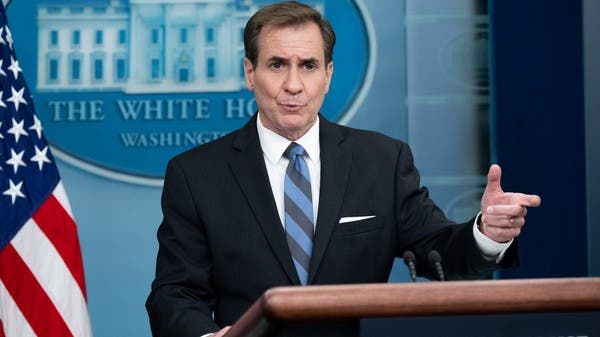John Kirby, the White House’s spokesperson for strategic affairs, said on Wednesday that he is unaware of the robust guarantees Iran seeks from the nuclear deal.
Kirby affirmed to Al-Arabiya and Al-Hadath that Washington provided the nuclear deal response to the Europeans and is negotiating in good faith, noting that the US administration is cautiously confident about making progress in the nuclear accord discussions.
The White House official also stated that there are still holes in the nuclear agreement and that work is underway.
According to a statement issued by the United Nations International Atomic Energy Agency on Wednesday, Iran has begun enriching uranium using the second of three sets of sophisticated centrifuges (IR-6) that Tehran recently installed at the subterranean enrichment site in Natanz. According to Reuters.
In a classified report to member nations, the agency said that the second set of centrifuges can enrich uranium to up to 5% fissile purity, while the third group has yet to be loaded with nuclear material. Centrifuges.
Earlier on Wednesday, Iranian Foreign Minister Hossein Amir Abdollahian stated that Tehran had received the American response to the European text, but that stronger guarantees were required, while Iran’s ambassador to the International Atomic Energy Agency stated that the IAEA’s requests were politicised and that they must be withdrawn.
Earlier in the day, Mohammad Eslami, the head of Iran’s Atomic Energy Organization, stated that if the International Atomic Energy Agency does not conclude its probe into Tehran’s undisclosed operations, the deal would not be implemented.
And, according to the website Iran International, Eslami, Iran does not have any undeclared nuclear installations. If the IAEA’s issues are not answered before all parties return to the JCPOA, there will be no day of re-implementation.
Islami saw the IAEA’s questioning as a continuation of those purported military readings, and he expressed his disbelief of the documents given against Iran concerning three locations.
In theory, Iran does not have an undeclared nuclear facility, he stated.
He went on to explain, “Negotiation is a give and take, not a construction piece choice in which you may say beautiful things.”
Yesterday, the Iranian Tasnim Agency reported an Iranian Atomic Energy Organization spokesperson as declaring that Tehran would not accept the International Atomic Energy Agency’s exorbitant demands.
We believe the IAEA’s expectations are unreasonable because their implementation is difficult due to sanctions. If the sanctions are lifted, Iran would reply in kind, according to Behrouz Kamalvandi, reported by Tasnim news agency.
Following months of indirect discussions, Tehran and Washington are attempting to resurrect the 2015 nuclear agreement.
The primary stumbling block is Tehran’s demand that the Atomic Energy Agency end its probe into uranium traces discovered at three unidentified locations before the nuclear accord is resurrected.
On Monday, Iranian President Ibrahim Raisi announced that reviving the agreement on his country’s nuclear programme is linked to the International Atomic Energy Agency closing the file of Iranian sites suspected of witnessing unauthorised activities, as negotiations between Tehran and major powers reached a critical stage.
The problem of earlier discovering evidence of nuclear materials at three places where Tehran did not claim to have observed such activity creates tensions between Iran, Western nations, and the United Nations agency on the one side.
While Iran regards this case as political, Western nations, notably the United States, are urging it to work with the IAEA to dispel these fears.
Raisi’s remarks came as Tehran is studying the United States’ response to Iran’s proposals in response to a final draught presented by the European Union, with the goal of concluding indirect talks between the two parties that began last year with the goal of reviving the 2015 agreement that Washington withdrew from in 2018.
Iran continues to enrich uranium at Natanz, while Washington refuses to provide Tehran any guarantees.

